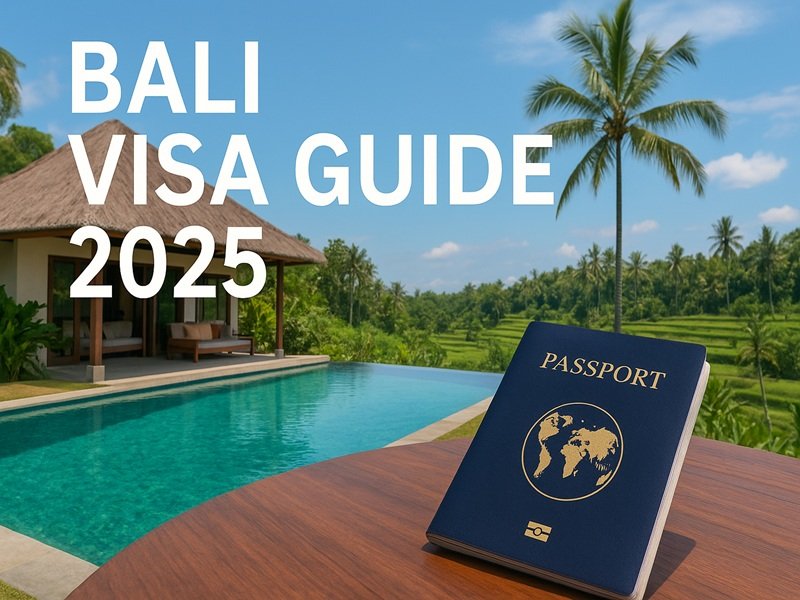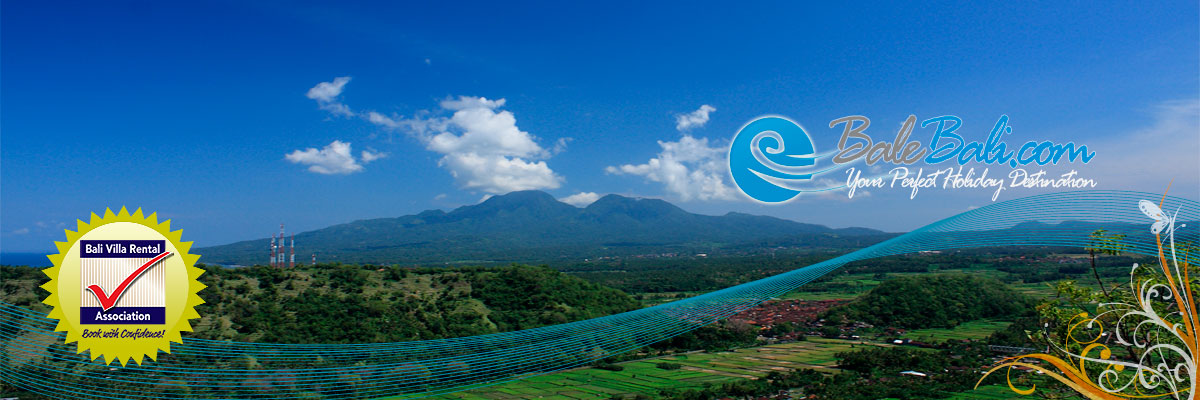Bali Visa Guide 2025 – How to Get Your Visa, Stay Duration, Costs, Pros & Cons for Villa Visitors

Bali is a hugely popular destination for tourists, digital nomads and villa-renters alike. But before you book that gorgeous villa with its infinity pool and rice-field view, it’s wise to understand the visa landscape. Getting your visa right means fewer surprises, less risk of over-staying, and more time enjoying island life.
In this article we’ll walk through the main visa types for Bali, how to obtain them, how long you can stay, the costs, and the pros & cons. We’ll also touch on how this connects with renting a villa in Bali and what you should keep in mind in that context.
Visa types: how many months / how long can you stay
When visiting Indonesia (and thus Bali), the visa rules depend on your nationality, the purpose of visit, the length of stay, and how many entries you want. Here are some common options:
1. Visa-free / Visa exemption
If you hold a passport from one of the ASEAN nations (for example) you may be allowed visa-free entry for up to 30 days, for tourism only. This stay is generally not extendable.
2. Visa on Arrival (VoA) / e-VoA
For many nationalities, you can obtain a VoA upon arrival (e.g., at I Gusti Ngurah Rai International Airport in Bali) or apply ahead online (“e-VOA”).
-
Valid for 30 days initially.
-
It is extendable once for another 30 days — so maximum 60 days.
-
Cost: roughly IDR 500,000 (≈ USD35) for the initial 30-day stay.
3. 60-day Visit Visa (C-type, e.g., 211A)
If you plan to stay longer than 60 days, you can apply for the so-called C-type Visit Visa (often 211A) before arrival.
-
Valid initially for 60 days; can be extended twice (two further 60-day extensions) so you could stay up to ~180 days (6 months) — though note the extensions cost money and require processing.
-
Cost: varies (some sources say USD 200–300 via agents) for the full process.
4. Long-term visas
If you’re looking at staying for many months or years (working, digital nomading, investing, owning property, etc), there are special visas/residence permits (KITAS, etc). These go beyond simple tourist stays.
How to get the visa: steps & requirements
Here’s a simplified step-by-step of how you typically get a tourist/visit visa for Bali, plus what you’ll need.
-
Check your nationality – Are you eligible for visa-free? Or for VoA? Or do you need to apply for the C-type in advance?
-
Passport validity – Your passport should be valid for at least six months from the date of entry and have blank pages.
-
Onward/return ticket – Immigration may ask you for proof you intend to leave.
-
Proof of accommodation – For many online application forms you’ll need to show where you’re staying (hotel, villa rental, etc).
-
Application & payment
-
For VoA you can often pay on arrival (cash, card) or apply via e-VOA to save queue time.
-
For C-type Visit Visa you often apply online or via embassy/agent ahead of voyage.
-
-
Arrival and immigration stamp / visa sticker – On arrival you’ll get the stamp (for VoA) and you must abide by stay duration rules.
-
Extension (if applicable) – If your visa allows extension (VoA once to 60 days; C-type further to 180 days) you’ll need to apply with the local immigration office before the visa expires.
How much it costs
Here is a breakdown of typical costs (note: rates can change, check latest before travel).
-
VoA for 30 days: About IDR 500,000 (≈ USD 35) for many nationalities.
-
C-type Visit Visa (60 days, extendable): Could cost USD 200-300 (depending on service/agent) for the process including extensions.
-
Longer term stays (90 days / 180 days): Sources say the stay up to 90 days now costs about IDR 1,500,000.
-
Other costs: The island also has a separate tourist levy (in Bali) for international arrivals: IDR 150,000 per person (approx) as of recent changes.
Pros & Cons
Understanding the upsides and drawbacks helps you plan better — especially if you’re tying this into staying in a villa or spending longer on the island.
Pros:
-
The VoA process is relatively simple and fast for many nationalities: you arrive, pay, submit documents, you’re in.
-
Flexibility: For many tourists the 30-day stay (or 60 days with extension) is enough for a holiday + villa stay.
-
With the longer 60- or 180-day visit visas, you can stay for months, giving you more time to enjoy Bali, rent a villa, settle in.
-
For villa renters or digital nomads, a longer visa means less frequent travel away, less hassle of short stays.
-
Villas and accommodation in Bali are generally abundant and the infrastructure supports tourists staying for weeks/months.
Cons:
-
Cost increases with length and complexity. Staying for months means more expensive visa types, extensions, agency fees.
-
Complexity: Longer visas often require more paperwork (proof of funds, sponsorship letters, visa agent, etc). The process may take longer.
-
Risk of overstaying: If you exceed your visa validity you may face fines (e.g., reports of fines of IDR 1,000,000+ per day) or even deportation.
-
For villa rentals: Some villas or accommodations may require you to present a valid visa/permit. If your visa is short or unstable you risk having to relocate.
-
Even when staying long-term, tourist visas do not by themselves permit working (unless you have the proper permit). If you plan to earn income, you need a different visa.
-
The rules may change: Immigration policy in Indonesia/Bali has been updated recently (fees increased, rules tightened). So what was valid last year may change.
Specifics related to villa living in Bali
If you’re looking at staying in Bali for a villa (either for holiday, rental or longer-term stay) the visa issue becomes quite relevant.
-
If your stay is short (say 2-4 weeks), the VoA (30 days) will often suffice. You rent a villa for a few weeks, use the simple visa, no major hassle.
-
If you plan to stay a month or two (or 3+ months) in a villa, it’s worth securing a longer stay visa (60 days or more) so you’re not scrambling for extensions or traveling out for “visa runs”.
-
When renting a villa long-term, accommodation providers may ask for your visa status. Some villas offer monthly rentals, and you want to ensure your legal stay aligns with your rental contract.
-
From a cost-perspective: If you pay more for visa extensions, it adds to your overall cost of living in Bali. Factor in visa cost + villa cost + lifestyle.
-
It’s also wise to have backup plans: if you extend visa, ensure the extension is approved before your villa contract ends, etc.
-
Respect local rules: staying long-term means deeper interaction with local environment, culture, regulations. Having your visa situation in order shows you’re a responsible guest/resident.
Final thoughts & tips
To wrap up, here are some practical tips to make the visa + villa stay in Bali smoother:
-
Check your nationality’s specific rules. Every country has slight variations. Use official immigration site: Direktorat Jenderal Imigrasi / e-Visa portal (e.g., evisa.imigrasi.go.id) to get latest.
-
Make your travel plans first: Accommodation, flight in/out, length of stay — this helps you pick the correct visa type.
-
Keep your documents ready: passport (6+ months), onward ticket, proof of funds, accommodation details. Mistakes or missing items may cause delay.
-
If staying long-term, plan visa extension or apply for longer visa ahead. Don’t leave it to last minute.
-
Understand your villa contract: If you sign a rental >30 days make sure your visa allows you to stay for at least that long (or ensure extension is viable).
-
Budget for visa costs: It’s not just the flight + villa; include visa fees, extension fees, agency fees (if any).
-
Respect the rules: Overstaying leads to fines, deportation, future entry bans. Better to leave a few days early than risk trouble.
-
Stay updated: Policies change. For instance, recent years saw increases in fees and new tourist levies in Bali.
If you’re planning a trip to Bali and perhaps staying in a villa, the visa piece is a key part of the puzzle.
-
For short stays: VoA (30 days) is convenient and affordable.
-
For longer stays: Consider the 60-day Visit Visa (with extension up to 180 days) or other long-term options.
-
The costs and paperwork increase with stay length, so plan accordingly.
-
Matching your visa duration with your accommodation (villa) stay will save stress.
-
Always follow the latest rules and be respectful of local regulations.
Bali Villas Articles
- Bali International Hospital Hub with Bali Villas in Sanur
- Bali Visa Guide 2025
- Romantic Bali Villa Getaways
- Digital Nomad Villas in Bali
- 2025 Bali Villa Design Trends: Japandi Style & Organic Curves
- Nyepi Day in Bali: How the Day of Silence Shapes Tourist Arrivals, Villa Stays, and Unique Travel Experiences
- Best Places to Build a Villa in Bali
- ROI Realities: Investing in Bali Villas in 2026
- Where to Stay in Bali for First-Time Visitors: Top 5 Areas for 2025
- Canggu Bali: Full of Tourists and Villa Developments Even in Low Season
- Seminyak Beach Bali — Still a Luxury Destination Amid Erosion Challenges
- Why Jimbaran Is Bali’s New Luxury Villa Hotspot in 2025 | Bali Villas Guide
- Bali Toll Road Plans and Their Impact on Villa Locations & Investment
- Amed Villas Development | New Bali Tourism & Villa Investment Destination
- Bali Villas Wedding – A Romantic Escape in Paradise
- Bali Diving Adventure | Explore Bali’s Underwater World Near Luxury Villas
- Bali Trekking Around Bali Hidden Trails and Stay in Scenic Bali Villas
- Bali Villas with Private Pools
- Kelingking Beach Nusa Penida Glass Lift Controversy




